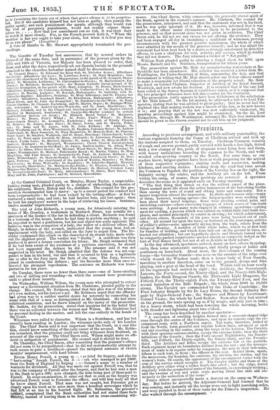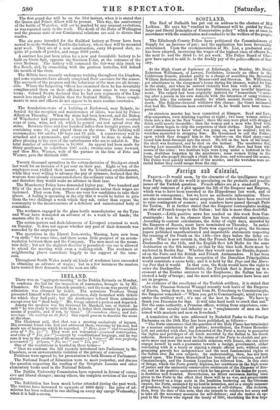tip puniurrg.
According to previous arrangement, and with military punctuality, the various regiments forming the Camp at Chobham arrived and took up the stations assigned to them, on Tuesday. Chobham Common consists of rough and uneven ground, partly covered with heath a foot high, dotted with a few clumps of firs, pools of stagnant water lying here and there, with heavy undulations bounding the expanse to the South, and well- wooded corn-growing country to the North. For some time, as our readers know, fatigue-parties have been at work preparing for the arrival of their respective regiments ; sinking wells and reservoirs, making kitchens, and erecting stables. Looking from the road that runs across the Common to Bagshot, the position of the Cavalry lies on the right, the Infantry occupy the centre, and the Artillery are on the left. From within the camp, of course, these positions are reversed. A spectator describes the scene as it appeared early on Tuesday morning. " The first thing that struck us was the solitary aspect of the place. There seemed more life about the active hammerers at the fast-rising booths than among the rows of round and oblong tents and semi-tents. But a nearer inspection altered the impression. In shirts and trousers only—many of them, however, wearing aprons—the fatigue-parties were working like bees about their novel lodgings. Some were erecting central poles and stretching canvass—others conveying baggage, of which scores of van-loads were arriving. A good many were engaged in culinary operations—cutting meat for cooking, a process which was carried on within little turf-built fire- places, and seemed principally to consist in stewing ; for which achievement, and divers others, thousands of tin pans were being knocked out of each other. All around lay upon the furze, or fluttered on the tent-ropes, articles of soldier's attire—some apparently drying from the wash, others from the deluge of Monday. A number of little white bales, which we at first took for bundles of bedding, and which were laid out on the ground in lines, at- tracted our attention ; but our hypothetic sheets and blankets turned out to be compactly-packed round tents—packed almost as compactly indeed as the tent of Peri Banou itself, but not at all so flexible in their nature."
As the day advanced, spectators arrived, many on foot, others in spring- carts, then some aristocratic carriages, and finally groups of ladies and gentlemen on horseback. About noon, the first column of the coming troops—the Grenadier Guards—was seen on the summit of the ridge over which wound the Windsor road ; then a larger body of Foot Guards, marching in another direction, came on to the ground, drums and fifes playing, and a goat at the head of the band. Within half an hour nearly all the regiments had arrived in sight ; the Artillery, the Seventeenth Lancers, the Forty-second, the Ninety-third, and the Ninety-fifth High- landers, the Sixth Dragoon Guards, the Thirteenth Light Dragoons, the Fiftieth Foot, the Thirty-eighth Foot, the Twenty-third Foot, and the second battalion of the Rifle Brigade ; the whole from 8000 to 10,000 strong. The Cavalry are commanded by the Duke of Cambridge ; the First Infantry Brigade by Sir De Lacy Evans, the Second Infantry Bri- gade by Major-General Fane ; the Sappers and Miners by Lieutenant- Colonel Vicars ; the whole by Lord Seaton. Soon after they had arrived on the ground, the tents sprung up as if by magic, and only just in time ; for a heavy storm, which had been lowering the whole morning, broke with thunder and lightning about two o'clock.
The camp has been described by another spectator-
" A succession of swelling heights formed into a crescent-shaped ridge runs through the centre of the Common, and upon its concave edge the en- campment rests, with a Northern aspect. The tents, therefore, looked at from the North, form graceful and regular hollow lines, advanced at each end and receding in the centre, along the verge of the horizon. The Cavalry, with their spacious canvass-stables, occupy the extreme right; then the three battalions of the Guards ; then the Forty-second Highlanders, the Ninety- fifth, and Fiftieth, the Thirty-eighth, the Ninety-third, and the Twenty- third. The Artillery and Rifles occupy the extreme left of the position. Each regiment keeps its boundaries distinct from the rest ; and the arrange- ment of tents is in regular order by companies, the men in their bell-tents, fifteen to each tent, in front ; the officers in the rear. Behind them, again, the mess-room, the hospital, the canteens, the kitchen, the stables, and the women's huts. Of course, the appearance of the encampment varies with the arm of the service which occupies it. The Cavalry stables and those of the Artillery give either wing a rather booth-like effect ; but the ridge, dotted regularly with the symmetrical tents of the Infantry, is exceedingly striking ; and the swarms of red and white coats moving about like ants add im- mensely to the animation of the scene." Prince Albert unexpectedly made a descent on the camp on Wednes- day. But before he arrived, the Adjutant-General had learned that he was coming, and instantly all the troops were out in light marching order, and were paraded in front of their tents for the Prinee'a inspection. He also walked through the encampment. The first grand day will be on the 21st instant, when it is stated that the Queen and Prince Albert will be present This day, the anniversary of the battle of Waterloo, will not be marked by any unusual evolutions, as was reported early in the week. The death of the Duke of Wellington and the present state of our Continental relations arc said to dictate that resolve.
The six guns intended for the Guilford battery at Dover have been moved from the Ordnance Yard to the battery, where they will be mounted next week. They are of a new construction, carry 68-pound shot, re- quire 10 pounds of powder, and range 3000 yards.
A contract has just been taken for a new and formidable battery to be built on Grain Spit, opposite the Garrison Point, at the entrance of the river Medway. The battery will command the fair-way ship track up Sea Reach, and, by cross-firing with the garrison batteries, will defend the mouth of the river.
The Militia have recently undergone training throughout the kingdom, and some regiments have already completed their exercises for the season. The accounts of the progress and the behaviour of the men are all favour- able. Where the Inspecting Officer has examined them he has invariably complimented them on their efficiency--in some cases in very strong terms: Colonel Stoyte declared that he had seen regiments of the Line march less steadily at Dublin than the Rutland Militia. These compli- ments to men and officers do not appear to be mere routine courtesies.
The foundation-stone of a building at Earlswood, near Reigate, in- tended for the reception and maintenance of idiots, was laid by Prince Albert on Thursday. When the stone had been lowered, and the Bishop of Winchester had pronounced a benediction, Prince Albert received cups of corn, wine, and oil, which he poured out and spread over the stone. Between three and four hundred ladies then brought purses, each containing some 51., and placed them on the stone. The building will accommodate 100 adults, 130 boys and 70 girls. A conservatory will be attached and a promenade, and everything will be done to make the place pleasing to the eyes of the unfortunates who are to inhabit it. The total number of subscriptions is 10,0001. An appeal had been made for thirty gentlemen to contribute 100/. each ; twenty-nine came forward, and then Mrs. Warner, wife of the partner in the firm of Peto and Warner, gave the thirtieth 1001.
Twenty thousand operatives in the cotton-factories of Stockport struck last week for an increase of 6 per cent on their pay. Eight or ten of the employers soon yielded their assent ; but the leviathan establishments, while they were willing to advance the pay of spinners, declared that the weavers were already remunerated above the ordinary rates of the district, and therefore they would make no advance in their case.
The Manchester Police have demanded higher pay. Two hundred and fifty of the men have given notices of resignation unless their wages are increased. They seem firm. There are very few candidates to take their places. A feeling is spreading in the city that it would be better to give them the two shillings a week which they ask, rather than expose the community to the inconvenience of a deficient and uninstruoted body of constables.
The workmen engaged in the glass bottle manufactories on the Tyne and Wear have demanded an advance of 4s. a week to all hands; the masters offer 28. a week.
The cotton-porters and dock-labourers of Liverpool returned to work on Tuesday. It does not appear whether any part of their demands was conceded by the employers.
The operatives in the Llynvi Iron-works, Maesteg, have now been "on strike " for some time, and there seems little prospect of an accom- modation between them and the Company. The men meet on the moun- tain daily ; but not the slightest disorder is permitted—no one is allowed to attend the meeting with even a walking-stick. The workmen at neighbouring places contribute largely to the support of the turn- outs.
Throughout South Wales nearly all kinds of workmen have succeeded in obtaining an advance of wages ; but in a few instances the masters have resisted their demands, and the men are idle.



























 Previous page
Previous page